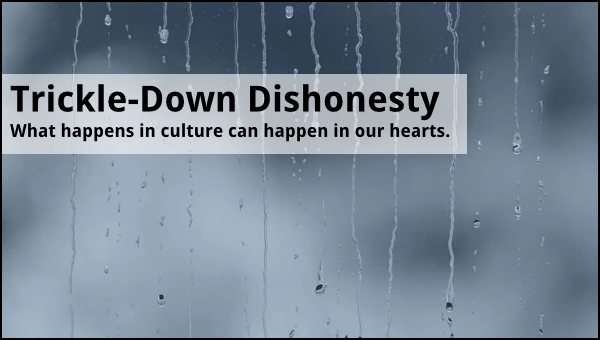By Tyson Thorne

Yesterday we asked a question, what happens to a culture when honesty no longer matters? Dishonesty trickles down, impacting other social structures along the way. One such case happened recently in Pueblo, Colorado when a young police officer faked body camera video to make an arrest. Police officer Seth Jensen admitted before the case went to trial, that the body-cam footage he submitted as evidence was a “recreation” of events rather than the objective, first-hand accounting it was supposed to be. The best thing we can say is that Officer Jensen didn’t let his dishonesty stand, and confessed.
What happens in social structures also happens inside our hearts. A little compromise with honesty leads to bigger and bigger lies until, as we mentioned yesterday, it becomes our go-to method for avoiding awkward conversations or situations. Soon, and usually without our even suspecting it, our word becomes untrustworthy. Solomon, the wisest man who ever lived, said, “Better is a poor person who walks in his integrity than one who is crooked in speech and is a fool” (Proverbs 19.1).
The most effective way to stop lying is to understand why you lie. It may appear that there as many reasons to lie as there are people, but it’s not that complicated. Most people lie for one of two reasons, to make’s oneself look better or to make other’s feel better about themselves.
In the first instance, one may lie to avoid incriminating themselves, to avoid an embarrassment or to make oneself more appealing to someone they are trying to impress. In all three cases, the end result is to appear as something we are not (we are not a criminal, not the person whose cell phone rang during the performance, or we are the person who would have made the Olympics of only Michael Phelps had been three-tenths a second slower). In the second case, we lie to make someone else feel better about themselves, or to avoid hurting their feelings. This might seem noble, but its anything but. Truth has a way of coming out, eventually. When it does it only sets those free who are on its side, so make sure you are on it’s side.
There are some instances when a lie is not a lie. Someone asks you for the time, and you tell them it 8:30 when your watch says 8:31. While you have not told the truth exactly, no one cares if you are that precise. A friend or significant other asks if a pair of pants makes a certain part of their anatomy look big, trust me when I say there is no expectation of honesty on your part. The third instance is more controversial. I would like to believe that there would never be a moment when telling a lie would actually be the right thing to do, but in a fallen world there are extreme situations when this is the case. The third principle is, it is acceptable to lie if the person you are lying to does not deserve the truth.
Obviously this statement needs some specifics. The classic moral dilemma is Nazi Germany, the SS was going door-to-door rounding up Jews to be taken to concentration camps. The officers would ask the homeowner if there were any Jews in the house, and the owner was faced with a desperate situation. To tell the truth would be to participate in a larger evil. There is Biblical precedent for this. Joshua chapter two tells the story of Rahab, a prostitute in the pagan city of Jericho. When city military showed up on her doorstep demanding she release the Hebrew spies to them, she lied about their whereabouts in order to save them. Nowhere in the Bible was she ever reprimanded for doing so and, instead, she was commended for receiving them in peace.
There are other examples as well. 1 Kings 22.2 records God ordaining a spirit to deceive Ahab. In 2 Kings 8.10 the prophet Elisha tells Hazel to give Ben-Hadad a [rp[hecy that veils the truth, and Hazel does just that. Jeremiah 38.24-27 tells us that, on advice from the king, the prophet lies to officials about his conversation with the king to save his life. 1 Samuel records multiple accounts; in chapter 16 God tells Samuel to not tell the whole truth to elders about the nature of his visit to their city, in chapter 21 David lies to the priest Ahimelech stating he was on a mission from the very king he was running from (Saul), and in chapter 27 David lies to the Philistine king Achish.
It should be noted that lying to save someone’s life is hardly an everyday event and such actions do not lead to habitual lying the way other lies do.
Finally, silence about a sin is not the same as condoning it. The Bible accurately records people’s actions and their words, but that does not mean we are to do everything the Biblical characters do. All I’m saying is that, in a corrupt and fallen world, there may be times when committing a small sin to avoid entanglement in a larger one might be the only option. That doesn’t make it okay, and we should still confess it as sin and ask God forgiveness.
|
|
